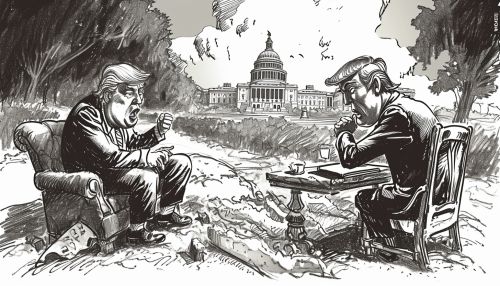Pulitzer Prize for Editorial Cartooning
Overview
The Pulitzer Prize for Editorial Cartooning is one of the fourteen American Pulitzer Prizes that are annually awarded for Journalism. It has been awarded since 1922 for a distinguished cartoon or portfolio of cartoons published during the year, characterized by originality, editorial effectiveness, quality of drawing and pictorial effect.


History
The Pulitzer Prize for Editorial Cartooning was first awarded in 1922, following the establishment of the Pulitzer Prizes in 1917 by the provisions in the will of Joseph Pulitzer, a Hungarian-American newspaper publisher. The category of Editorial Cartooning was included to honor the unique and vital role of political cartoonists in American journalism.
Selection Process
The selection process for the Pulitzer Prize for Editorial Cartooning is rigorous and thorough. The Pulitzer Board, consisting of distinguished journalists and media executives, reviews the work of finalists selected by the Pulitzer Jury for Editorial Cartooning, which is composed of cartoonists, newspaper editors, and educators. The Jury reviews all entries submitted by cartoonists or their publications, and selects three finalists. The Board then reviews these finalists and votes to determine the winner.
Notable Winners
Over the years, many distinguished cartoonists have been awarded the Pulitzer Prize for Editorial Cartooning. Some of these include:
- Herblock (Herbert Lawrence Block), who won the prize three times (1942, 1954, 1979) for his cartoons in The Washington Post. His work was noted for its powerful commentary on national and international affairs.
- Bill Mauldin, a two-time winner (1945, 1959) for his work in the St. Louis Post-Dispatch and the Chicago Sun-Times. Mauldin's cartoons provided poignant and humorous commentary on the human condition.
- Garry Trudeau, creator of the comic strip Doonesbury, who in 1975 became the first comic strip artist to win the prize.
Impact and Significance
The Pulitzer Prize for Editorial Cartooning has played a significant role in American journalism and political discourse. The winning cartoons often reflect the pressing social and political issues of the time, providing insightful commentary and criticism. The prize has also helped to elevate the status of editorial cartoonists, recognizing their work as a vital form of journalism.
See Also
- Pulitzer Prize for Breaking News Reporting - Pulitzer Prize for Investigative Reporting - Pulitzer Prize for Explanatory Reporting
